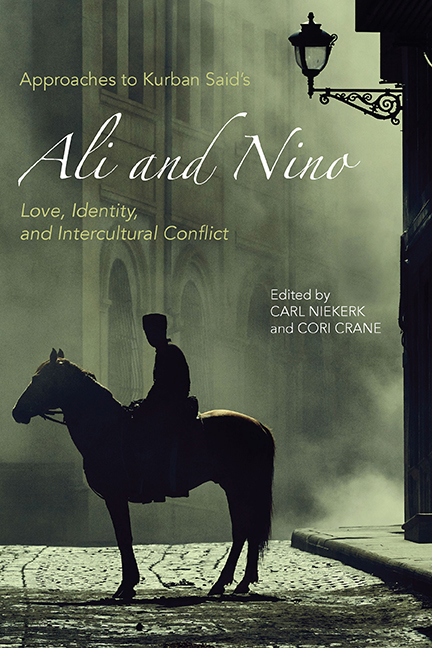Book contents
- Frontmatter
- Contents
- Acknowledgments
- Notes on Editions of and References to Ali and Nino
- Introduction: Ali and Nino as World Literature
- 1 Ali and Nino: The Novel as/of Cultural Translation
- 2 Crossing Borders, Crossing Disciplines: Ali and Nino in the Twenty-First Century
- 3 Glowing Rubies and Persian Daggers: The Role of Persian Poetry in Ali and Nino
- 4 Gendered Stereotypes and Cross-Cultural Moral Values through the Eyes of Kurban Said
- 5 Orientalist Itineraries: Cultural Hegemony, Gender, Race, and Religion in Ali and Nino
- 6 Gendered Conflicts in Muslim and Christian Cultures: Honor (and Shame) in Ali and Nino
- 7 Love and Politics: Retelling History in Ali and Nino and Artush and Zaur
- 8 “Herr Professor, Please: We'd Rather Stay in Asia”: Ali Khan Shirvanshir and the Spaces of Baku
- 9 The Female Body and the Seduction of Modernity in Ali and Nino
- 10 Seeing the Unseen: Symbolic Writing in Ali and Nino
- 11 Ali and Nino and Jewish Questions
- 12 Between Orientalism and Occidentalism: Culture, Identity, and the “Clash of Civilizations” in Ali and Nino
- Works Cited
- Notes on the Contributors
- Index
5 - Orientalist Itineraries: Cultural Hegemony, Gender, Race, and Religion in Ali and Nino
Published online by Cambridge University Press: 30 August 2017
- Frontmatter
- Contents
- Acknowledgments
- Notes on Editions of and References to Ali and Nino
- Introduction: Ali and Nino as World Literature
- 1 Ali and Nino: The Novel as/of Cultural Translation
- 2 Crossing Borders, Crossing Disciplines: Ali and Nino in the Twenty-First Century
- 3 Glowing Rubies and Persian Daggers: The Role of Persian Poetry in Ali and Nino
- 4 Gendered Stereotypes and Cross-Cultural Moral Values through the Eyes of Kurban Said
- 5 Orientalist Itineraries: Cultural Hegemony, Gender, Race, and Religion in Ali and Nino
- 6 Gendered Conflicts in Muslim and Christian Cultures: Honor (and Shame) in Ali and Nino
- 7 Love and Politics: Retelling History in Ali and Nino and Artush and Zaur
- 8 “Herr Professor, Please: We'd Rather Stay in Asia”: Ali Khan Shirvanshir and the Spaces of Baku
- 9 The Female Body and the Seduction of Modernity in Ali and Nino
- 10 Seeing the Unseen: Symbolic Writing in Ali and Nino
- 11 Ali and Nino and Jewish Questions
- 12 Between Orientalism and Occidentalism: Culture, Identity, and the “Clash of Civilizations” in Ali and Nino
- Works Cited
- Notes on the Contributors
- Index
Summary
ALI AND NINO IS A CURIOUS and most probably a rather rare example of a literary text both wittily denouncing Orientalist imagery tied to Western cultural hegemony while simultaneously weaving a tight net of Orientalist stereotypes itself when it comes to religion, gender, and race. If Edward Said had known of the novel, he would, without a doubt, have included it in his analysis to show how literary works have contributed to the emergence of the discourse of Orientalism. Also, he could have praised Ali and Nino as a predecessor of his own enterprise to critique European cultural hegemony and its basis in Orientalism. Precisely these two facets of Orientalism in Kurban Said's novel deserve a deeper analysis. I will show that the author's unmasking of Orientalism as a strategy of power is connected to an attempt to demonstrate European and Russian cultural dominance while simultaneously trying to get rid of this hegemony. However, in Ali and Nino 's treatment of masculinity and femininity, religion, and race, Orientalist stereotypes play a crucial role.
The Critique of European and Russian Cultural Hegemony and the Advocacy for Cultural Relativism
Seen through the prism of Orientalism, Ali and Nino consistently lays bare the functioning of Western claims to cultural superiority involving the construction of an inferior East. The hilarious opening scene of the novel depicting a geography lesson at the Imperial Russian Humanistic High School of Baku goes in this direction. The professor tells the pupils about the geographically undefined status of Baku, lying in between Europe and Asia, with “a self-satisfied smile on his lips” (4; Der Professor lächelte selbstgefällig, 5), introducing a clear hierarchy between the two geographical areas: “It can therefore be said, my children, that it is partly your responsibility as to whether our town should belong to progressive Europe or to reactionary Asia” (3–4; Es hängt also gewissermaßen von Ihrem Verhalten ab, meine Kinder, ob unsere Stadt zum fortschrittlichen Europa oder zum rückständigen Asien gehören soll, 5). The pupils are first overwhelmed and then rebel. First, Ali's friend Mehmed Haidar states that he prefers to belong to Asia, and then Ali joins him (4/6).
- Type
- Chapter
- Information
- Approaches to Kurban Said's Ali and NinoLove, Identity, and Intercultural Conflict, pp. 89 - 113Publisher: Boydell & BrewerPrint publication year: 2017

